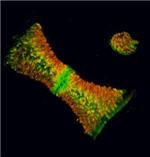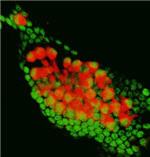Researchers have tracked a cell-to-cell signaling pathway that designates the future location of the ear's sensory organs in embryonic mice. The scientists succeeded in activating this signal more widely across the embryonic tissue that becomes the inner ear. Patches of sensory structures began growing in spots where they don't normally appear.
The structures contained tufted cells, called hair cells, which respond to sound waves and other sensations, and additional nerve cells that amplify or code sounds for the brain to interpret.

B. Hartman,T. Reh, O. Bermingham-McDonogh
Pictured is a normal sensory patch from one of the balance organs in a mouse inner ear. Right beside it is an additional patch of sensory tissue that has been induced by activation of the Notch pathway particular type of cell-to-cell signaling uring development. This patch contains both the sensory nerve cells known as hair cells (red) and their associated supporting cells (green).

B. Hartman, T. Reh, O. Bermingham-McDonogh
An example of a sensory patch produced when Notch signaling is activated during development. The patch contains the sensory hair cells (red) and their associated supporting cells (green).
The results suggest an avenue for further investigation in restoring hearing loss from nerve damage.
The findings are reported this week in the early online edition of Proceedings of the National Academy of Sciences by researchers Byron H. Hartman, Thomas Reh, and Olivia Bermingham- McDonogh of the Department of Biological Structure at the University of Washington (UW) in Seattle. All three are members of the UW Institute for Stem Cell and Regenerative Medicine. The senior author, Bermingham-McDonogh, is also an affiliate of the UW Virginia Merrill Bloedel Hearing Research Center.
"As the population ages," said Bermingham-McDonogh, "there's a great interest in discovering how to regenerate the inner ear sensory cells that we need for our hearing and balance. Both of these falter as we get older e get hard of hearing and unsteady on our feet ue to accumulated destruction of the sensory cells in the inner ear."
The goal of their research is to develop ways to restore inner ear sensory hair cells in people who have lost them due to age, excessive noise or other toxic damage. The hair cells do not spontaneously recover after they are lost, and adult stem cells have not been found in the mammalian inner ear. In order to devise a way to restart hair cell formation in the adult ear, Bermingham-McDonogh's group is studying how hair cells are made in the first place during ear development.
The first stage in the normal development of hair cells is called prosensory specification. In the growing embryo, regions of the ear-forming tissue are selected to become the inner ear organs that detect sound and allow for our sense of balance. This action is similar to digging the foundation of a building. All the subsequent, complex steps in the construction of the building require a solid foundation.
Byron Hartman, a postdoctoral fellow in the Bermingham-McDonogh lab, found that a signaling system called the Notch pathway is important in laying the foundation for the inner ear sensory hair cells and their associated supporting cells. The researchers were able to activate the Notch pathway in regions of the inner ear that would normally never make hair cells and convert these regions to patches of new sensory tissue. In other words, they could encourage the formation of new building foundations throughout the inner ear. Once these new sensory patches were made, new hair cells and support cells were properly produced within them. So by starting the ball rolling with the Notch signal, the researchers observed that the rest of the developmental processes followed along correctly.
Notch proteins straddle the inside and outside of the cell membrane. They collect information at the cell surface and report to the cell's operations center, the nucleus. Embryologists and cancer researchers have been studying the Notch pathway for many years. More recently scientists in the regenerative medicine field have begun taking advantage of this key regulatory signal to restart developmental processes in adults.
"The Notch signaling for prosensory specification does not appear to be active in the mature inner ear," the UW researchers noted, "and this could explain their lack of ability to regenerate new hair cells." They are now studying ways of manipulating the Notch pathway in the adult inner ear to see if this will stimulate hair cell regeneration in the hearing and balance organs.
If ways could be found to safely re-start particular Notch signals in adults, therapies might be designed to regenerate specific tissues, like nerves, and thereby repair damage and restore lost function, like hearing. Perhaps this knowledge, they noted, may lead to ideas on how to re-create this earlier state in the mature adult ear to stimulate re-growth of the cells critical to hearing.
The research for "Notch signaling specifies processor domains via lateral induction of the developing mammal inner ear" was supported by a National Research Service Award and grants from the National Institute on Deafness and Other Communication Disorders and National Eye Institute, both part of the National Institutes of Health, and assistance from the Lynn and Mike Garvey Cell Imaging Laboratory at the UW Institute for Stem Cell and Regenerative Medicine Research.
Taken from uwnews.org/article.

